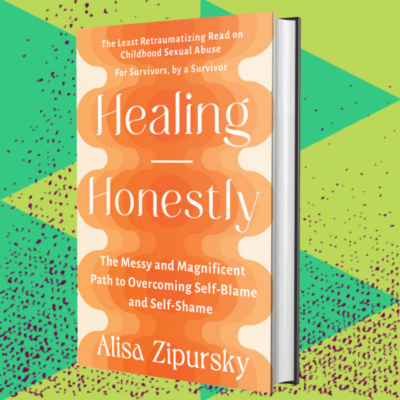This story references the impacts of sexual trauma and mentions, but doesn’t describe, sexual violence that can happen at a doctors office.
Last week I did a little digging into my own medical records and discovered that I hadn’t been to the gynecologist since 2017. I used to work at Planned Parenthood and was constantly preaching to my friends about the importance of taking care of their reproductive health, so I was shocked that I had let myself go four years without a pap smear or having my IUD checked out. I, like so many survivors born with uteruses, fucking hate going to the gyno, and I suppose my aversion to the whole experience has been keeping me from accessing the healthcare I need.
So, I made an appointment and I took to the internet to see what other survivors have to say about how to make these trauma-laiden experiences a little easier and more accessible. Inspired by this wonderful article, 10 Tips For Visiting The Gynecologist As a Survivor of Childhood Sexual Abuse by Sage Martin on TheBodyIsNotAnApology.com, I wrote a list of strategies I’ve used and tips from Healing Honestly readers to help us navigate getting the healthcare we need while honoring the trauma that lives in our bodies.
Being self-compassionate about how triggering going for an exam may be for us
The first thing that I want to say to anyone else who finds the gynecologist triggering is that we should be super compassionate towards ourselves when thinking about why it is such a difficult experience for us. As survivors, we are conditioned to feel so much shame about our bodies and their trauma responses. I’d ask you to consider whether you’re holding onto any shame about how emotionally and/or physically painful it is to get examined, or holding any shame for delaying or avoiding getting examinations. It is not our fault, nor is it a lack of fortitude that leads us to feel this way.
Not only can it be triggering for us to experience the physical sensations of the examination, but the doctor/patient power dynamics can be hella triggering too. I hate it when I see a doctor and they behave like they are the boss, as opposed to us being equal partners in the room. I find pretty much any authority figure in my life challenging, and combining that with the vulnerability that comes with being physically examined can feel awful.
I also want to send love and support to all the survivors I know who were sexually harmed by their doctor. Too many people, including children, carry the trauma of a doctor sexually abusing them. To you all I just want to wrap my arms around you and say I totally understand why going to the doctor is so painful and traumatic and I hope you can be extra super understanding and loving with yourself about it. I know you are doing your best to take care of yourself and keep yourself safe, and you are choosing between a lot of painful options for how to do that.
Choosing the right clinician for us
The next strategy deals with choosing the right clinician for this type of care, but even typing this out it feels not quite right to mention as a strategy because far too many survivors have really limited access to healthcare and don’t have the privilege of getting to choose their doctors. So I first want to acknowledge that, while it shouldn’t be, it is a privilege to pick our doctors and even have access to trauma-informed reproductive healthcare.
For those who do have the option to choose their clinicians, I’ve heard from so many survivors who said that they, overall, had much more positive experiences with women gyns than men. While I’ve only ever been to one gynecologist who was a cisman, the experience definitely reinforced for me that I only wanted people who knew what it was like to have a vagina to be my doctor. He totally downplayed the pain of my IUD insertion and even laughed when I screamed in pain. Not cool, bro. Flash forward 7 years to when I got a cool young lady doc who, when she was preparing to replace my IUD said, “Oh yeah, when I got mine it definitely hurt, so we will make sure to give you the meds you need for your comfort.”
I’ve also had better luck generally with younger clinicians. In my limited experience, it seems like the younger doctors are coming in generally more trauma-informed and aware of how to care for patients in a way that centers their safety and comfort. I would also say, if you have a chance to see a nurse practitioner, nurse midwife or a physician’s assistant, then I totally recommend that as I find (again generalizations!) that they are super super centered on the patient experience in a way I just haven’t experienced with MDs.
Sharing as much or as little as feels right to us
Just like any other aspect of our story, no one, not even our clinicians are entitled to our disclosure. We share what we want, how we want, and with whom we want. With that said, I have found it helpful to clue in my clinician by writing on the intake form that I have C-PTSD or that I live with a history of trauma. For extra assurance that they got the message, I may say immediately, as soon as the clinician walks into the room, “I just want you to know I have a history of trauma.”
The good clinicians have never asked me follow-up questions like, “What happened?” If you find your clinician is asking you follow-up questions you don’t want to answer, you can reply with, “I am not comfortable sharing more, I just wanted you to know so that you can be mindful of my need to _______ [insert here what you’d like, for example: to take it slow, to walk me through the steps as you go, take breaks, etc].
In their article When a Pelvic Exam Is Traumatic, Dr. Huma Farid writes from the provider’s perspective offering a list of things patients can say to clue their doctor:
“Maybe you’re wondering what to say. People may start the conversation in different ways. Here are some ideas that may help:
- You might start by saying, ‘I feel anxious when I come to the doctor.’
- You could say a few words about what worries you: being touched, needing to undress, having a pelvic exam.
- You can choose how much to explain. ‘I’ve experienced sexual assault. I’d rather not talk about the details, though.’
- You can even keep it vague: ‘Pelvic exams are difficult for me because of my history.’
- You can share any ideas you have about how to make you comfortable during a pelvic exam or any medical exam. Please also share anything that you’ve found helpful. ‘It might help if you explain steps before doing them. I hope you’re willing to go slowly, stop for a break, or even stop the exam if I start feeling overwhelmed.’
Asking for the accommodations we need to feel safe during our appointment at the doctor
Before your visit, I recommend reflecting on what you would need in order to feel safer and more comfortable during your appointment and coming prepared to offer yourself whatever that may be. I heard from readers who suggested taking anxiety meds in advance and bringing essential oils to smell to help manage triggers, for example.
One thing that I’ve learned from Black feminist fat activists on the internet is that I can decline to be weighed when I go to the doctor, as more often than not, it is not actually medically necessary. While personally my weight is not connected to my sexual trauma, I have been traumatized by many doctors throughout my life around my weight. Learning I can decline this step in the exam has made going to the doctor a much more comfortable experience for me.
Remember, you and your provider are in a partnership. Even if the power dynamics suggest that they are in the driver’s seat and we are just the passenger, we have an important opportunity to advocate for our safety needs. Some ideas for how to do this include asking the provider:
- If every step they are doing is medically necessary at this moment. Sometimes they can delay certain steps if it may be too much for us at once.
- To talk you through every step of the process, including having them ask you if you’re ready at every step so you set the pace
- To use the smallest available speculum (I do this every time, without fail, and I do find it’s less painful than when they use the standard speculum size)
- To talk to you about dumb stuff during the exam if that’s helpful for distraction
- To take breaks as you need so that you don’t feel you need to “power through” an uncomfortable experience
- To have your headphones in so you can listen to your own calming music or a meditation app
- Or anything else that makes you feel safer and more comfortable or helps you manage triggers.
I’ve had really positive experiences with these requests and also watched a lot of patients have good experiences with these requests when I was working at Planned Parenthood. If your clinician isn’t supportive of these requests, know that it means they’re an asshole and bad at their jobs, not that there’s anything wrong with you!
Exchanging important information during the exam
In addition to clueing in our clinicians to our history of trauma, there is other important information that patients and providers exchange during visits. Mercedes, a survivor, offered me some wonderful tips on this: “I arrive with a pre-written record of my history/symptoms/analysis because I know that I will dissociate and not remember or lie about random stuff just to get out of there, which won’t be useful at all!” Mercedes also shared with me that she tells the doctors to ask all their questions before the physical exam as she is working hard to manage the trigger after the exam, so she isn’t thinking as clearly. Her last wonderful suggestion is to write down everything, or ask the provider to write down everything for you, because our memory isn’t always the clearest while having to manage triggers. All great ideas I plan to use at my upcoming appointment.
Having a care plan for after our appointment
Whenever doing something that we know is challenging for us, it is important to have a plan in place to help us return to our bodies, soothe our nervous systems and celebrate our very hard work. As Sage Martin says in her article, “When you complete one of the most daunting, intimidating, and terrifying tasks in your life…you deserve to treat yourself in whatever positive way you want!”
Whether it is taking time to nap and rest, or going out with friends who will help you feel centered, or eating something super delicious and comforting, come up with a plan that feels good to your soul and helps you look forward to the other side of the appointment. As for me, I plan to go to this great shawarma place near the doctor’s office and then come home to snuggle my puppy and watch Love Island.
Please remember, no matter how hard it may feel, you are not alone! So many of us are struggling to get healthcare that is trauma-informed and makes us feel safe and truly cared for in the way we need and deserve. Remember this feels difficult because it is difficult. I know you’re doing your absolute best to take care of yourself and I’m sending you so much love.

